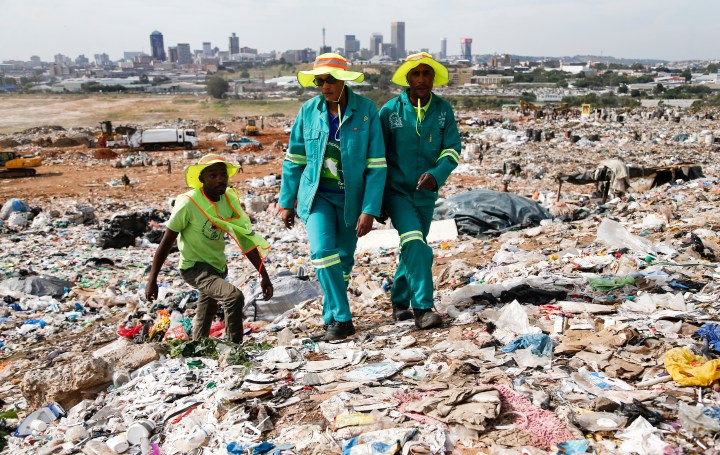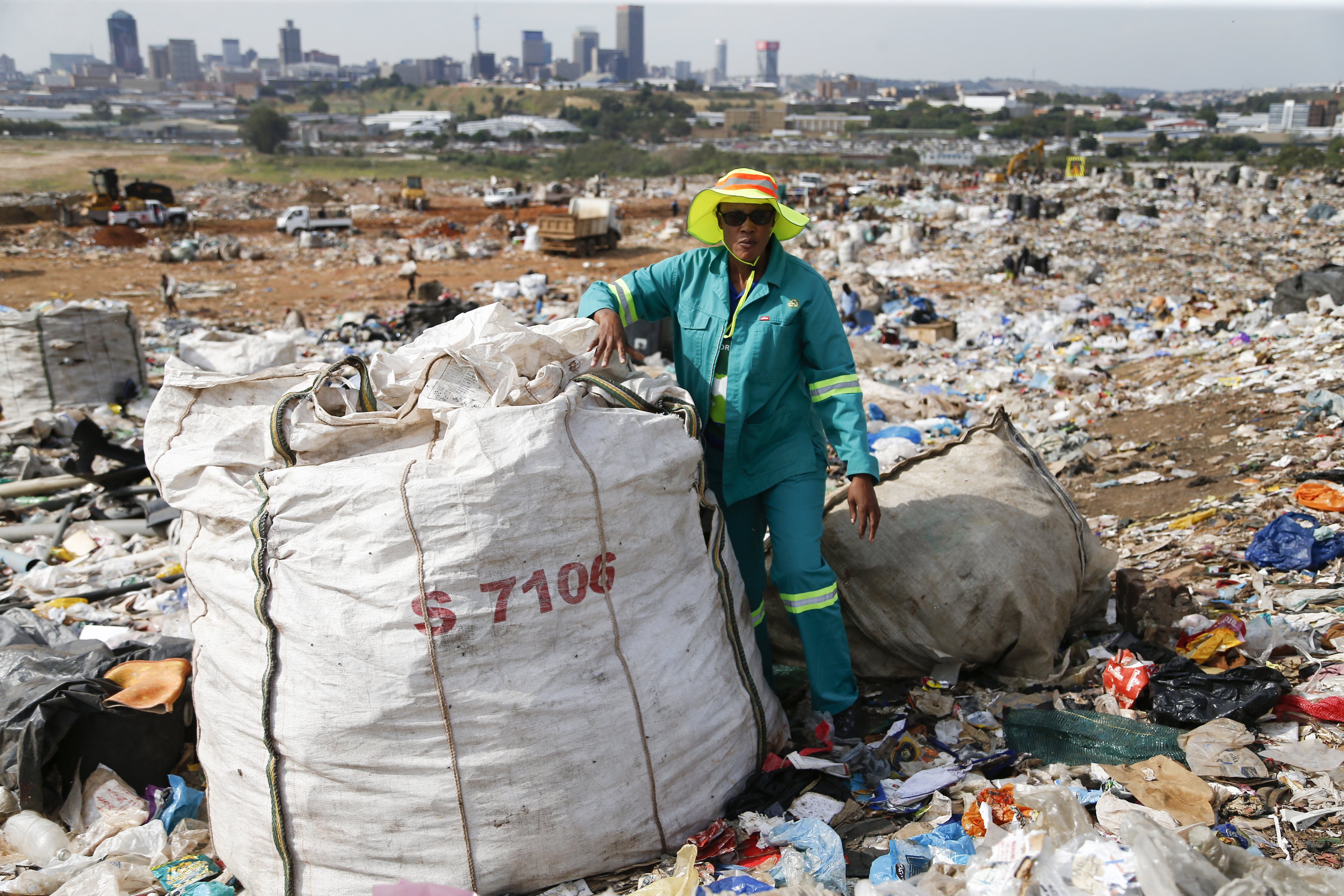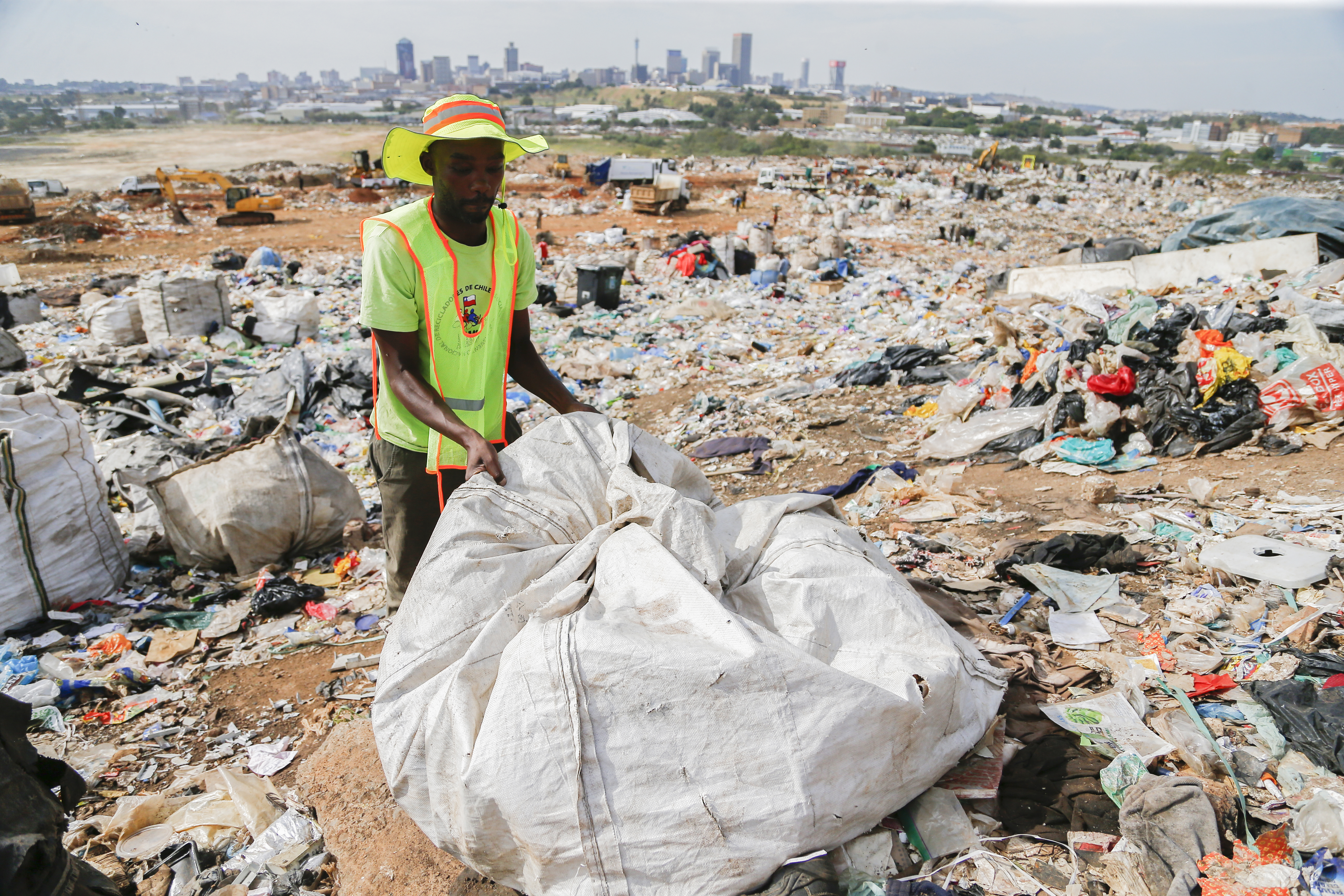WASTE NOT
Trash course — a look at Joburg reclaimers’ daily battle for recognition

Despite playing a vital role in recycling, reclaimers operate on the margins of society.
‘We don’t consider it waste picking because waste is something that has no value. We call it reclaiming. We reclaim reusable and recyclable materials that have value. We are not waste pickers. I don’t collect waste, I am a reclaimer,” says Luyanda Hlatshwayo, African Reclaimers Organisation (ARO) spokesperson and business development manager.
Hlatshwayo previously ran a restaurant in Newtown, Johannesburg, and is now a veteran reclaimer with more than a decade’s experience. Reclaimers like Hlatshwayo sort through trash and pick out all the valuable materials such as plastics and tins, and sell them for recycling purposes to make a living. The collected material is hauled from all over the city to a sorting site where materials are separated and subsequently sold.
A day in the life of a reclaimer
Waking up early is an essential part of the job, as reclaimers are in a race to beat the municipal rubbish collectors before they empty people’s bins and take the waste to landfills, where they will no longer be able to access the materials.
“At 3am, most reclaimers are busy setting up their trolleys. Sometimes people do not understand why we [reclaimers] are sleeping by the park. It is because I am competing with Pikitup [Johannesburg’s waste management entity]. There is also competition among us as reclaimers, and if I go home with a small bag, I won’t be able to buy food,” said Hlatshwayo.
Walking is another essential part of the job as a reclaimer, with some of them walking roughly 15km every day.
“I am in Newtown next to the mall where there is a lot of what I am looking for, but I have to travel all the way to Rosebank because at the mall they don’t understand what I am doing,” said Hlatshwayo.
People will say things like ‘these guys are criminals, that guy is homeless, he is dangerous’.
Reclaimers work long hours and are exposed to all kinds of weather.
From Monday to Saturday, Mantoa Khoali starts her day at 3am.
“I make sure I am on time to go with the men because it is risky for me to be walking alone in the dark as a woman. I stay in Doornfontein and on Mondays I work in Rosebank, so I walk there. After I collect, I pull my trolley to my sorting space and sort my material,” said Khoali, who is part of the ARO’s engagement team.
Sorting is one of the hardest and most time-consuming aspects of their work and involves setting aside post-consumer waste materials at the point of generation to prevent them from entering the waste stream destined for landfills.
Motlatsi Ponoane said it takes copious amounts of energy and determination to be a reclaimer.
“We wake up so early and we walk long distances, even if it is raining or it is very hot, pulling hundreds of kilograms over long distances because we want to sustain ourselves,” said Ponoane, who is also part of the ARO engagement team.

Mantoa Khoali at the Robinson Deep landfill. She has been doing this work since 2016 and it pays for her son’s agricultural studies. (Photo: Felix Dlangamandla)
The weighing game
For reclaimers, the heavier the recyclable, the better. Buy-back centres, where reclaimers sell their materials, pay by the kilogram.
The prices paid for recyclable materials are not regulated, which means one week reclaimers can earn about R3,000 but in another only R1,000 for materials of the same weight.
One of the most sought-after materials is aluminium, typically used in soft drink cans. One kilogram of these cans can earn reclaimers almost R20 at a buy-back centre.
“Glass is recyclable but it has less value. It is heavy and difficult to pull with a trolley,” said Hlatshwayo.
On the margins of society
Reclaimers like Khoali, Hlatshwayo and Ponoane are everywhere and invisible at the same time.
They are efficient environmental workers operating on the margins of society. Despite being at the core of waste-management processes across the globe, they are often ill-treated, and even criminalised, by the public and authorities alike.
“People will say things like ‘these guys are criminals, that guy is homeless, he is dangerous’. They will see you… looking for recyclable materials in bins and think you are dirty and on the streets because you are a nyaope [a cheap drug] boy. They don’t recognise reclaiming as work,” said Hlatshwayo.
I am a single parent but my son is at college studying agriculture in Lesotho, all through reclaiming.
Khoali, now chairperson of the ARO, became a reclaimer in 2016 after realising she could earn more than she could as a domestic worker.
Ponoane said it is common for reclaimers to be insulted as they go about their daily tasks.
“People think we are hobos or drug users and sometimes they are insulting us, or they don’t give us space and it’s difficult,” he said.

Luyanda Hlatshwayo, the African Reclaimers Organisation spokesperson and business development manager, at the Robinson Deep landfill in Johannesburg on 12 March 2024. (Photo: Felix Dlangamandla)
Life without reclaimers
Robinson Deep in southern Johannesburg is the oldest landfill site in Johannesburg and is almost at capacity. Without reclaimers redirecting materials, it could reach its capacity even sooner, since reclaimers divert up to 24 tonnes of recyclable waste per reclaimer per year from South Africa’s landfills.
Read more in Daily Maverick: Waste pickers need formal recognition, and full and fair remuneration for their services
Research has shown that reclaimers contribute to extraordinary savings in landfill airspace and are responsible for salvaging 80% to 90% of post-consumer paper and packaging extracted from the waste stream, extending the lifespan of landfills.
“When we started our programmes there were two trucks going to the landfill. Now the rubbish doesn’t even fill one truck. We are saving the municipality thousands of rands and you can see the free labour again that has not been recognised, but it is working,” said Hlatshwayo.
One person’s trash…
“We found gold in the bins and we have been able to sustain our families. I haven’t got a call from my landlord ever since I started this job,” said Hlatshwayo.
Khoali has been able to put her son through school. “I am a single parent but my son is at college studying agriculture in Lesotho, all through reclaiming,” she said.
Ponoane said he takes great pride in being a reclaimer and sustaining himself through this. “To be a reclaimer you learn a different way to live and save the environment. Being a reclaimer does not mean you aren’t educated or you are suffering. It is work just like any other work,” he said.
We do not want to beg, we don’t want to do crime and we would rather go through your bin to make a living.
During the Covid-19 lockdown, some of the residents who were farmers and could not sell their produce to retailers, gave it to the reclaimers.
“We started distributing food, not only to reclaimers but to communities who needed it, and we are still doing food distribution programmes today,” said Hlatshwayo.
The reclaimers have also managed to build a crèche and are in the process of building another one.
“What happens to a reclaimer’s child when they wake up at 3am and go to work? We needed to find a solution and our crèche has been running for almost three years now,” said Hlatshwayo.
“We redirected toys, clothes and books that Bordeaux residents had outgrown and now our crèche does not need anything. It has everything and it shows the power of being organised and integrated in communities.”
Read more in Daily Maverick: Letter from Gauteng: The waste picker of 30th Avenue, Pretoria
There are more than 20,000 reclaimers in Johannesburg who make a living by collecting, sorting and selling recyclable waste.
Hlatshwayo stressed that it was not the reclaimers who needed to integrate with the government or communities, but rather reclaimers educating society so that they can be integrated into their system.
“We do not want to beg, we don’t want to do crime and we would rather go through your bin to make a living,” said Hlatshwayo. DM
This story first appeared in our weekly Daily Maverick 168 newspaper, which is available countrywide for R29.

















 Become an Insider
Become an Insider
If I knew what materials to pre sort, I would do so before putting my waste out.
Every week, after these ‘pickers’ have been through the trash, and Pikitup has come around, there is trash all over the pavements in our area. I have to rake it all up off the road and pavement outside my house, and re-bin it all.
I despise these people!
Never mind them obstructing rush hour traffic with their big trolleys. They aren’t road users, they should be taken off the streets.